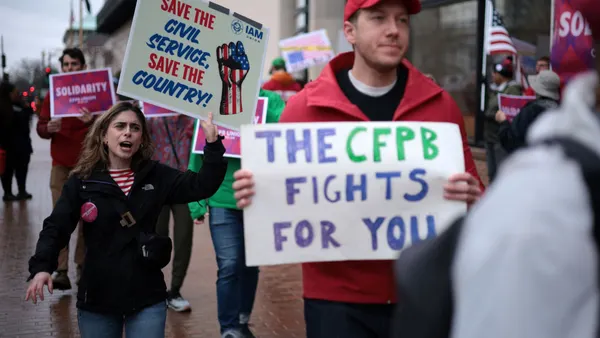Federal Reserve Gov. Michelle Bowman put on blast Tuesday a proposal from the Federal Deposit Insurance Corp. that would more closely scrutinize bank mergers.
Under the proposal, issued last month, the FDIC would put greater emphasis on measuring the impact to local communities for mergers yielding institutions with $50 billion or more in assets.
While one basic barometer historically has been deposits — a single bank cannot exceed 30% of deposits in a given state, for example — the FDIC showed it’s willing to “deviate from the long-standing approach” regarding deposits, said Bowman, a Republican.
Rather than use deposits as a broad brush, “that agency” — Bowman didn’t identify the FDIC by name Tuesday in a speech at the Kansas City Fed — “would ‘evaluate the competitive effects of a proposed merger in a manner that is most relevant to each transaction,’ and ‘may consider concentrations in any specific products or customer segments,’” she said.
Looking at potential mergers on a more molecular level and on a case-by-case basis would add an element of unpredictability to proposed mergers from bank executives’ standpoint, Bowman said.
“I imagine bankers contemplating merger transactions will have little capacity to evaluate whether a merger would raise regulatory issues in advance under this open-ended standard,” she said.
Applicants should be "prepared to make commitments regarding future retail banking services in the community to be served for at least three years following consummation of the merger," Bowman quoted the FDIC proposal as saying.
Advocacy groups, at times, have taken the lead in negotiating community benefit plans with banks that are merging, for example.
Regulators, too, can subject merger applications to conditional approval, imposing restrictions on a transaction that are meant to satisfy specific supervisory or policy concerns.
“While this can be an important tool, it should not be used to replace rulemaking or existing regulations and statutes that guide regulatory action,” Bowman said. “We should not engage in ‘regulation by application.’"
Consumer Financial Protection Bureau Director Rohit Chopra, a Democrat on the FDIC board who voted yes on the proposal, spoke Wednesday — also regarding mergers — at an event held by the National Community Reinvestment Coalition, an advocacy group that frequently lobbies for community benefits.
"We see so many individual towns, cities, communities, have dealt with the harms inflicted by the creep of consolidation across the banking sector," Chopra said, according to American Banker. "The community should be better served by the combined institution, not just shown that it won't be worse.”
A merger must address an unmet need in the community and improve a community’s product services or delivery channels, Chopra said.
For her part, Bowman said banks should expect to provide information on their plans for activities and branches during the application process.
“But we should acknowledge that those plans may change over time as conditions evolve,” she said. “We need not operate like the applications process is the only tool available to address policy concerns.”












